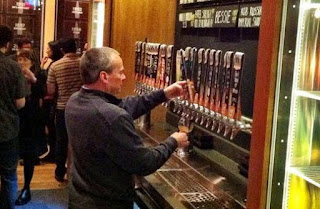However, tomorrow I depart for Miami to begin the final leg of the book tour. I'm arriving early so I can enjoy a bit of sunshine and Cuban food. Thereafter follow these stops, for anyone who happens to be nearby:
- November 4 at 8pm, Miami, FL
Books and Books, Coral Gables - November 5 at 7pm, Tampa, FL
Hidden Springs Ale Works - November 6 at 5pm, Atlanta
Ale Yeah Craft Beer Market (you can also pre-order signed copies) - November 8 at 2pm, Nashville
Yazoo Brewing special event - November 9 at 6:30pm, Richmond, VA
Ardent Taproom - ticketed event ($30 gets you the book and three Ardent beers) - November 10 at 6:30, Washington DC
Busboys and Poets Brookland
The Pabst complex is so compelling because it’s so tangible. Capitalism is a violent and sometimes jarring force, and as quickly as it graces a business with the generative power to rise from the pavement, it can strike it right back down. For 15 decades, that brewery continued to grow in lunges, expanding capacity to remain lean and efficient, to gobble up more and more of the growing market. The excitement and energy we are witnessing in brewing now is no different than the one that visited the U.S. 150 years ago when German immigrants brought their brewing expertise and inspired drinkers with lager beer. But in 1996, the same calculus that fueled that empire also led to the decision to quit the place: beer could be made more cheaply elsewhere. In a pen stroke the buildings went dark.Read the rest here. Finally, Patrick and I have a new Beervana Podcast on the subject of cider. It coincided with the Cider Made Simple book launch last night (with very serious thanks to Nat West, Kevin Zielinski, Abram Goldman-Armstrong, and Silas Bleakley and Kristina Nance). In this week's episode, we do a survey course on cider. (At one point in the podcast, there's an inadvertent Happy Halloween from the producer. You have to listen to hear it.)
You can also listen to it on iTunes.







